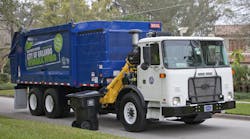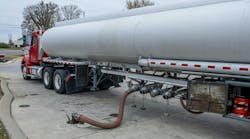Over five years ago, when Mayor Buddy Dyer launched Green Works Orlando, his vision of an environmentally friendly community encompassed almost every aspect of life in the Central Florida city and its surrounding area. Taking up the challenge along with other city departments was the Fleet & Facilities Management Div.
Daryl Greenlee, Orlando’s fleet manager, oversees an operation with 2,500 vehicles and pieces of equipment used by city departments. The division provides maintenance, repairs and replacement of trucks, police cars, fire apparatus, and a fleet of 79 front-line and 12 reserve solid-waste refuse units.
“Over the next three years, all of our residential garbage trucks will be converted to hydraulic hybrid models,” Greenlee relates. “We’re in the process of replacing 30 residential refuse trucks with Autocar E3 models powered by Parker hybrid drive systems and fitted with Heil automatic side loader bodies. We’ve had nine of these units on the road for just over 18 months and nine more are scheduled to be delivered.”
Supplied by Kenworth of Central Florida, the trucks feature the Parker RunWise Advanced Series hybrid drive systems along with a Cummins ISL9 engine, a proprietary power drive unit (PDU), hydraulic pump/motors, and composite bladder accumulators. Energy recovered from the vehicle’s braking system is stored and used to power the truck each time it accelerates. As the truck approaches highway speed, the PDU transfers from hydrostatic drive to mechanical drive, maximizing operating efficiency.
“While the initial cost of the hydraulic hybrids is higher than that for traditional diesel-powered units, the premium is easily justified,” Greenlee says. “In our fleet, the Autocar E3s using the Parker RunWise hybrid system have been using up to 50% less fuel than our diesel units, which we’ve verified with telematics. Not only is that a substantial savings in fuel costs, the truck’s emissions are significantly reduced.
“Some of the savings we’re realizing are also coming from lower maintenance costs,” Greenlee continues. “On our diesel trucks, we perform three or four complete brake jobs every year. At $3,000 each, that’s at least $90,000 over a 10-year service life. With the hydraulic hybrids, which use brake energy recovery to slow the vehicle, we’re projecting that we won’t need to replace any brakes until year 10.”
Other savings contributing to the return on investment are longer service intervals, facilitated by having smaller engines to power the hydraulic hybrid system, and the elimination of a transmission. Additionally, with smoother deceleration, tire life appears to be better, lowering tire costs. No steer tires have been replaced on the Autocar E3s, Greenlee reports. Also, the majority of the hybrid trucks are only on their second set of drive tires, as compared to as many as three sets on the diesel units.
There are productivity improvements as well.
“After the initial deployment, we discovered that some routes using hydraulic hybrids are faster by an hour,” says Greenlee. “We actually had supervisors follow those trucks to see why and soon realized the faster times were due to the quicker acceleration with the hybrid systems. That can translate into longer routes with fewer trucks and the ability to serve new neighborhoods without increasing fleet size.”
Green Works Orlando is a vision to transform the fifth largest city in Florida into one of the most environmentally friendly communities in the nation. And the city’s Fleet & Facilities Management Div. is fielding refuse vehicles that can help achieve that goal at the lowest possible cost.



